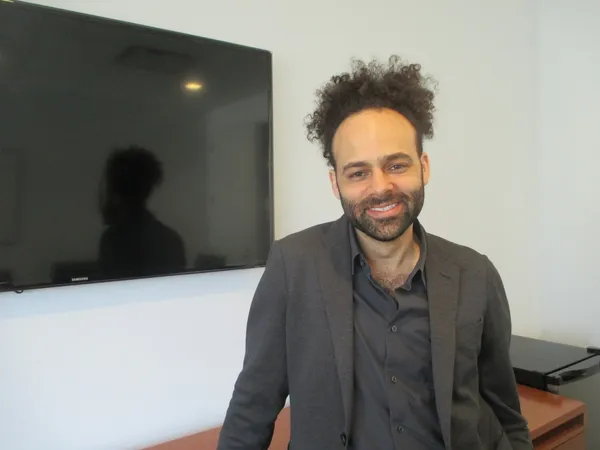At last year's Tribeca Film Festival, jurors Zosia Mamet, Joshua Leonard and Josh Charles awarded Shawn Snyder the New Narrative Director Competition prize and the Tribeca filmgoers agreed, voting To Dust the Audience Award.
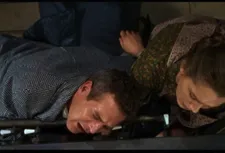 |
| Professor Armstrong (Paul Newman) and the farmer's wife (Carolyn Conwell) stuffing Gromek (Wolfgang Kieling) into the oven in Alfred Hitchcock's Torn Curtain |
After speaking with Géza Röhrig, who co-stars with Matthew Broderick in Shawn's début feature, which he co-wrote with Jason Begue, the director and I connected two Alfred Hitchcock films: The Trouble With Harry for Edmund Gwenn, Mildred Natwick, Shirley MacLaine, and John Forsythe, and a scene from Torn Curtain where Paul Newman as Professor Armstrong and the farmer's wife, played by Carolyn Conwell, stuff Wolfgang Kieling as Gromek into an oven.
A "brilliant move" by production designer Alexandra Kaucher turns into a "go-between" for Albert (Broderick) and Shmuel (Röhrig) as they are having a conversation about death in front of an encased human skeleton. I start out by asking Shawn Snyder about the undertaker (Joseph Siprut) and the very very inquisitive Shmuel.
Anne-Katrin Titze: It's fascinating the different moods you summon in To Dust and that your actors capture. I was just talking to Géza about how much seriousness there is in it and at the same time so much humour, which often comes from the precision of the dialogue.
 |
| Albert (Matthew Broderick) with Shmuel (Géza Röhrig): "From script level on there were folks who questioned "Why does Albert get into this?" And I said 'The right actor is going to let us know.'" |
I am thinking for example about the undertaker at the funeral parlour. First he is giving the party line and then he is switching. Did you encounter someone like him? Where did he come from?
Shawn Snyder: He was designed as the party line, you know, as sort of our peek into what often gets called the funeral industrial complex. It was based on a lot of reading that I did in terms of that world. There's this whole bizarre world called The Order of the Good Death and the death-positive movement.
Their mission is to reconfigure our society's relationship to death and have a healthier relationship to death. But in doing so it casts a light on the practices of the funeral industry. You get the sense of almost with that character, somebody who is forced to deliver the party line so much, finally being allowed to just say "Screw it, there's no sale here. I'm going to give it to you honest."
AKT: "Can I let you in on a little secret there, Handsome." That's how he phrases it. There is so much unconventional bonding in the film. With Stella [Natalie Carter], the security guard, later on, on cancer. People bond on the strangest things in real life, too. And that's what you capture.
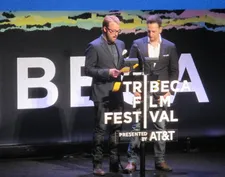 |
| Joshua Leonard and Josh Charles announcing that Shawn Snyder won the Tribeca Film Festival New Narrative Director Competition for To Dust Photo: Anne-Katrin Titze |
SS: And there's the idea that despite the odd specificity of the film and of the world from which Shmuel comes, you know, grief unites us all. The existential condition unites us all, and loss. It's a way that we, despite our differences, can see our shared humanity.
And that in this world as Shmuel goes through it, people don't necessarily know how to deal with him, but he is met - it's almost like God is shining on his journey, in this weird way. As blasphemous as he's being, that he is met with empathy and with folks along this road who help him to the next step.
AKT: He is also so obsessed with it that he's just pushing and they have to come along. It's almost that he has that pull, Dybbuk or not.
SS: This single-minded focus is almost, I don't know, somewhere on the spectrum, in terms of needing this one thing. I think, even as we were writing, before we were able to see Géza's face in there, there was this sort of hangdog puppy dog-ness. Where people were just "Okay. How can I help you?"
In terms of the alchemy of the way that Albert [Broderick] gets pulled into his world. From script level on there were folks who questioned "Why does Albert get into this?" And I said "The right actor is going to let us know."
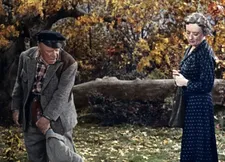 |
| Edmund Gwenn as Captain Albert Wiles with Mildred Natwick as Miss Ivy Gravely in Alfred Hitchcock's The Trouble With Harry |
AKT: I love how you introduce Matthew Broderick with that little animal skeleton at the bottom of the frame.
SS: Oh my gosh, I love you for picking up on that. I have to attribute that to a happy accident. I believe that that was in the classroom where we were shooting. It was the production designer's [Alexandra Kaucher] brilliant move to place it where she placed it.
There's this moment too, remember the skeleton is hunched over, and it's from the angle where Albert tips the desk where he goes down and he leans over too? And comes up with it and almost mirrors that skeleton?
AKT: It's fantastic. I don't even know what animal it is.
SS: I'm not even sure. A porcupine? Or an armadillo?
AKT: It's the perfect way to introduce him because it is exposing his fragility and the absurdity.
SS: And they're having the conversation about death in front of the encased human skeleton, that's just like the go-between.
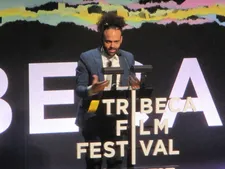 |
| Shawn Snyder accepting the Tribeca Film Festival New Narrative Director Competition award Photo: Anne-Katrin Titze |
AKT: Then there is Albert's teaching experience you show us so well. "I'm trying to office hour with Stanley [Larry Owens] here." To have office hour as a verb! All of this was in the script?
SS: So much of it was in the script and then there were beautiful improvisation happy accidents or true method acting on behalf of both Géza and Matthew. You know, Matthew's Albert's malapropisms were written into the film. That he would just get caught up and stumble upon these words.
AKT: Echo systems.
SS: Echo systems, yeah.
AKT: Hasidic soil.
SS: Yes but there was one thing Matthew added by just being the character or sheer acting or improvisational flourishes, to this day I don't know. Where he says "leaky bucklets" instead of buckets and then gets frustrated.
AKT: The Trouble With Harry by Hitchcock with the digging up and down, did that inspire some things?
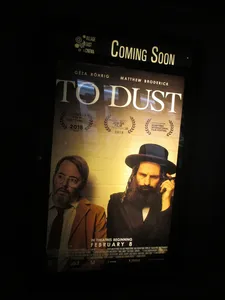 |
| To Dust poster at Village East Cinema - opens on February 8 in New York Photo: Anne-Katrin Titze |
SS: Yeah, we had watched that. There's also - I don't remember which Hitchcock film it comes from - but it's a suffocation scene that we had looked at. For how they should kill the pig. This sense of staring at it or looking away and what's implied versus what's suggested.
AKT: A suffocation scene?
SS: Maybe was it an oven?
AKT: Torn Curtain? East Germany, where they push Gromek into the oven?
SS: Yes! Into the oven! But also Trouble With Harry, too.
AKT: It was very impressive. I got scared for the pig.
SS: You know, marking, pulling that scene off! Again you have your storyboards and you have the epic way in which you're going to shoot this film and the animatronic pig of your dreams that this production could never afford and what we're going to get this pig to do and then you're stuck with what the pig is actually willing to do for you on its own.
Like, pig wants to clock out and it's hungry and it's about ready to leave. Really finding that tone of both - the not turning away from, but the horrific, but the comedic and in that moment. And at what point is too much and does the film jump the shark or jump the pig? But what's enough?
I'm so immune because it came from our heads and we lived with it for so long. I'm always delighted when the shock value and not just the comedic value of that scene does play out. In the economy and in the Hitchcockian way - well, it's going to be behind those couches. In some ways because that's a fake pig, in other ways because we want that what's happening in your imagination is more powerful than what's happening behind that couch.
Read what Géza Röhrig had to say on Matthew Broderick, Shawn Snyder, a lullaby his grandfather used to sing to him, and Ariel Marx, the composer of To Dust.
To Dust opens in the US on February 8.
On Saturday, February 9, Géza Röhrig and Shawn Snyder will participate in a Q&A moderated by Anne-Katrin Titze following the 7:30pm screening at Village East Cinema.








